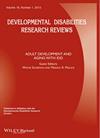{"title":"“Family matters:” Fetal alcohol spectrum disorders and the family","authors":"Heather Carmichael Olson, Rosalind Oti, Julie Gelo, Sharon Beck","doi":"10.1002/ddrr.65","DOIUrl":null,"url":null,"abstract":"<p>Information about “family matters” is vital to developing targeted interventions, reducing placement disruption, and enhancing outcome in fetal alcohol spectrum disorders (FASD). The quality of the caregiving environment and family function are associated with long-term outcome in natural history study of individuals with FASD. This article integrates multiple information sources to better understand the role of family factors in the outcome of individuals with FASD, and how the family is affected by raising a child with this lifelong condition. A brief description of the useful informal literature is brought together with a review of the surprisingly limited body of systematic research findings on FASD and caregiver/family function, and new data describing children with FASD and characteristics of their caregivers. Directions for future data-gathering and intervention development emerge from combining what is already known with an exploration of what can be learned from a highly targeted review of family-related data in the wide-ranging, general literature on developmental disabilities, and use of a proposed conceptual framework that joins a developmental systems perspective with a family systems approach. © 2009 Wiley-Liss, Inc. Dev Disabil Res Rev 2009;15:235–249.</p>","PeriodicalId":55176,"journal":{"name":"Developmental Disabilities Research Reviews","volume":"15 3","pages":"235-249"},"PeriodicalIF":0.0000,"publicationDate":"2009-09-03","publicationTypes":"Journal Article","fieldsOfStudy":null,"isOpenAccess":false,"openAccessPdf":"https://sci-hub-pdf.com/10.1002/ddrr.65","citationCount":"169","resultStr":null,"platform":"Semanticscholar","paperid":null,"PeriodicalName":"Developmental Disabilities Research Reviews","FirstCategoryId":"1085","ListUrlMain":"https://onlinelibrary.wiley.com/doi/10.1002/ddrr.65","RegionNum":0,"RegionCategory":null,"ArticlePicture":[],"TitleCN":null,"AbstractTextCN":null,"PMCID":null,"EPubDate":"","PubModel":"","JCR":"","JCRName":"","Score":null,"Total":0}
引用次数: 169
Abstract
Information about “family matters” is vital to developing targeted interventions, reducing placement disruption, and enhancing outcome in fetal alcohol spectrum disorders (FASD). The quality of the caregiving environment and family function are associated with long-term outcome in natural history study of individuals with FASD. This article integrates multiple information sources to better understand the role of family factors in the outcome of individuals with FASD, and how the family is affected by raising a child with this lifelong condition. A brief description of the useful informal literature is brought together with a review of the surprisingly limited body of systematic research findings on FASD and caregiver/family function, and new data describing children with FASD and characteristics of their caregivers. Directions for future data-gathering and intervention development emerge from combining what is already known with an exploration of what can be learned from a highly targeted review of family-related data in the wide-ranging, general literature on developmental disabilities, and use of a proposed conceptual framework that joins a developmental systems perspective with a family systems approach. © 2009 Wiley-Liss, Inc. Dev Disabil Res Rev 2009;15:235–249.
家庭问题:胎儿酒精谱系障碍和家庭
关于“家庭问题”的信息对于制定有针对性的干预措施、减少安置中断和提高胎儿酒精谱系障碍(FASD)的结局至关重要。在FASD患者的自然史研究中,护理环境质量和家庭功能与长期预后相关。本文整合了多种信息来源,以更好地了解家庭因素在FASD患者预后中的作用,以及家庭如何因抚养患有这种终身疾病的孩子而受到影响。简要介绍了有用的非正式文献,回顾了关于FASD和照顾者/家庭功能的系统研究结果,以及描述FASD儿童及其照顾者特征的新数据。未来数据收集和干预措施发展的方向是,将已知的情况与探索从关于发育障碍的广泛、一般文献中高度有针对性的家庭相关数据审查中可以学到的东西结合起来,并使用拟议的概念框架,将发展系统观点与家庭系统方法结合起来。©2009 Wiley-Liss, Inc。Dev - disability Rev 2009; 15:35 - 249。
本文章由计算机程序翻译,如有差异,请以英文原文为准。

 求助内容:
求助内容: 应助结果提醒方式:
应助结果提醒方式:


